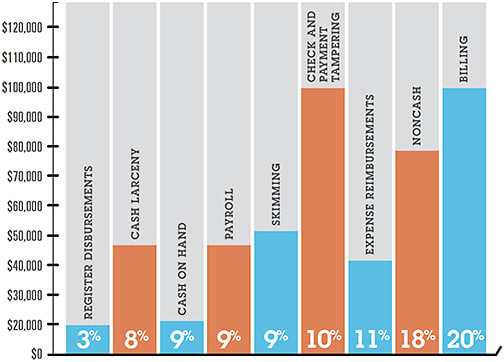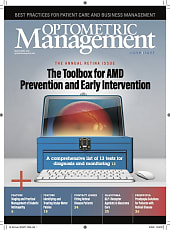
Embezzlement has occurred since money has been printed. While many optometrists feel their employees are loyal and would never take money from them, that’s not always the case. I have seen cases of small amounts of theft: one for about $11,000, and I have heard of massive embezzlement; the biggest one over $250,000 from a 20-year employee. As a result, it’s imperative that practice owners watch their finances carefully.
Here, I discuss why staff members embezzle, how they go about it, the signs of embezzlement and, most importantly, what optometrists can do to prevent it.
WHY STAFF EMBEZZLE
There are many reasons staff members embezzle. Some have extreme debt, others have gambling problems, some steal because they can, and some steal to “help” friends or loved ones. For example, I had a staff member whose boyfriend was a drug addict, and she was embezzling from me to support that addiction.
Knowing why a person embezzles is not always possible because today we are legally limited in our ability to ask detailed questions about a staff member’s personal life, what they do, family/friends, etc. The more we know about people, the better we can try and understand who they are.
HOW STAFF EMBEZZLE
The ways that staff steals varies. Some never record a payment and delete the charges. I had a case where the front desk staff person who collected payments actually had a second receipt book and wrote the patient a receipt out of that book and marked in the record “unpaid.”
I have seen brazen staff that take checks: They have the patient make the check out to the doctor personally and not the business. The staff member then deposits or cashes the check after writing the doctor’s name, then “pay to the order of” and their name. (The good news here is that this is occurring much less since banks are getting strict on the depositing of business checks not made out to the specific person whose account they are depositing into.)
Another way that employees steal is by giving their friends and/or family discounts on eye care products, such as frames or sunglasses, that are not allowed. These staff members may not have physically taken the OD’s money, but they have given it away to someone else.
In today’s computer age, creative staff members could either attempt to re-direct credit card payments to their personal account or actually hack into the optometrist’s office account and transfer monies to a “ghost” account that is not directly in their name. Hackers today can be sneaky about how they access monies.
Recently, I heard from two practices whose bank accounts were hacked and hard to track.
SIGNS OF EMBEZZLEMENT
There are some telltale signs of embezzlement. First and most important, if the practice has been growing or continuing to produce normally, but there is no money left in the checkbook, something is wrong unless the OD made a major purchase. Optometrists should look at their profit and loss (P & L) statement to see whether anything odd, like a large dollar amount they are unsure of, stands out. I recommend looking at your office P & L at least monthly. I looked at mine weekly. I have a friend who looks at his account daily. The point is to keep close tabs on it.
Other signs:
- Past due notices about bills.
- An employee who refuses to teach a colleague how to do their financial job.
- An employee who wants to work hours when no one else is around.
- An employee who takes accounting items, day sheets, or office copies of credit card slips home with them.
- Patients complaining the practice has recorded their payment incorrectly.
- A manager who insists on doing routine tasks themselves when another staff person could be doing them.
- A major change in an employee’s lifestyle without any major change in their job.
In 2021, Cases of Occuprational Fraud Occurred Most Often in These Four Departments
OPERATIONS15%

ACCOUNTING12%


EXECUTIVE/UPPER MANAGEMENT11%


SALES11%


Source: Association of Certified Fraud Examiners. Occupational Fraud: 2022. A Report to the Nations. https://acfepublic.s3.us-west-2.amazonaws.com/2022+Report+to+the+Nations.pdf . Accessed March 15, 2023.
WHAT OPTOMETRISTS CAN DO
ODs can take seven action steps to thwart theft:
- Perform a background check. I feel that in today’s world, not only should optometrists follow-up carefully on references before employment, but possibly also do a credit check. I understand the privacy issues, but certain types of credit checks are allowed.
- Separate staff responsibilities. If the OD has enough staff, I suggest having one staff member accept the payments during the day, and then another staff member balance the day sheet. This way, there will be no question of the money balancing at the end of the day and no “fudging” of the numbers.
- Control the checkbook. Many staff members now have access to a signature stamp, enabling them to stamp any check they write. Those ODs who have the same person write checks and reconcile their bank statement are at an increased risk of losing control of their finances. Do a periodic P & L statement, and look at expenses, comparing on a year-to-year basis. YOU DO IT. Don’t have the same staff person who writes your checks do it.
- Use blocking software. Remember to customize what “tasks” on the computer each employee can do in the security section of your software.
- Install security cameras. Set these up in various areas of your office, especially over the front desk or wherever payments are taken.
- Open all mail. Doctors many times feel they are too busy to open the mail, so they have staff open it. That is up to you. I, personally, am old school. I had the mail put on my desk and opened the obvious checks, and then gave them to the appropriate staff member to input into the computer.
- Perform audits. A practice’s computer system should have the ability to perform audits of payment history, and this should be done periodically.
Asset Misappropriation Schemes That Cause the Greatest Risk to a Business

BE THE CHIEF FINANCIAL OFFICER
In summary, the OD owner should be aware of the finances of their practice by being the practice’s chief financial officer. This means preventing embezzlement by determining what money comes in and goes out of the practice. It also means holding staff who steal accountable. Unfortunately, I believe the only way to handle these situations is to immediately fire the employee and report them to the police. I know that reporting the employee to the police is both time-consuming, as well as psychologically draining, but it can prevent other optometrists from going through the same grueling situation. OM




